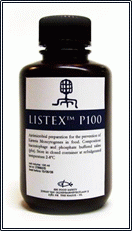 In recent years, Listeria monocytogenes has been the cause of many serious foodborne diseases, being a very versatile bacterial pathogen it grows within both plant and animal cells in a very wide temperature range. For these reasons, the scientific community and the food industry are looking for new and more effective strategies to control the bacterium.
In recent years, Listeria monocytogenes has been the cause of many serious foodborne diseases, being a very versatile bacterial pathogen it grows within both plant and animal cells in a very wide temperature range. For these reasons, the scientific community and the food industry are looking for new and more effective strategies to control the bacterium.Spanish scientists from Catalonia (Spain) have evaluated the effectiveness of Listex P100 in controlling the development of L. monocytogenes on melon, pear and apple, which have been processed both as fresh-cut produce (slices) and as juice and stored at 10 °C for 8 days.
Listex P100 is a commercial preparation containing safe and natural bacteriophages. The scientists wanted to study how Listex P100 can change its effectiveness according to the physical form of food matrix (solid vs. liquid) and fruit pH.

Click here to enlarge.
For the study, both slices and juices were inoculated with a cocktail of 3 strains of L. monocytogenes. The slices were first inoculated with the pathogen and then the scientists applied the suspension by pipetting bacteriophages on the slices; the juices were mixed with a solution containing both the pathogen and the bacteriophage suspension so to obtain an homogeneous distribution of the pathogen and phage.
The results showed that the pathogen developed very well on the untreated slices; while the pH of the fruit affected the pathogen development in the juices. It was observed that the pathogen developed in the untreated melon juice, survived in the untreated pear juice and decreased in the untreated apple juice.
Treatment with bacteriophage was more effective on the melon, followed by pear, while it had no effect on the apple-based products. Reductions of L. monocytogenes population were of 1.50 and 1.00 log cfu/plug on the slices of melon and pear, respectively; while after 8 days of storage, higher reductions were found in juices: 8.00 log cfu/ml in the melon juice and 2.10 log cfu/ml in the pear juice.
The L. monocytogenes was not affected by treatment with bacteriophages in apple juice, even bacteriophages decreased almost reaching the instrument detection limit, probably due to the high acidity of the product.
This study demonstrated that Listex P100 may prevent the development of L. monocytogenes on fresh-cut fruit and on fruit juices with high pH during storage at 10 °C, while its effectiveness on fruit with low pH may increase by its combination with other technologies (antagonists organic, essential oils, etc..).
Treatment with bacteriophages is a promising, safe and environmentally friendly technique that does not impact the food and could be a viable alternative to the use of chemical treatments.
Source: Oliveira M., Viñas I., Colàs P., Anguera M., Usall J., Abadias M., "Effectiveness of a bacteriophage in reducing Listeria monocytogenes on fresh-cut fruits and fruit juices", April 2014, Food Microbiology, Vol. 38, pagg. 137-142. http://www.sciencedirect.com/science/article/pii/S0740002013001809








